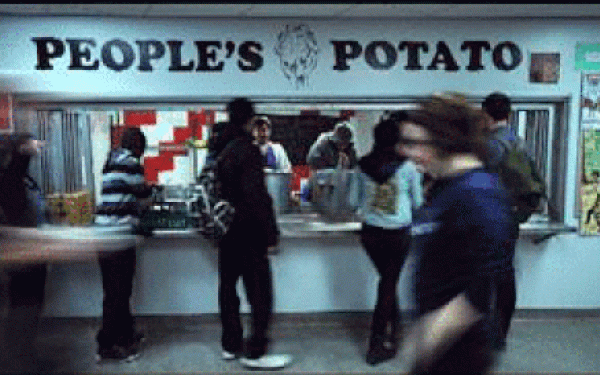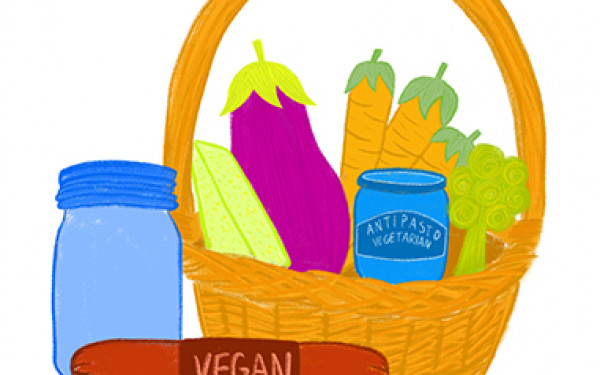A Fee Levy Referendum Question for the Concordia Food Coalition
CSU Council Votes in Favour of Allowing Ballot Question Despite Missed Application Deadline
At a special council meeting on Oct. 16, the Concordia Student Union voted in favour of allowing the Concordia Food Coalition to have a fee-levy referendum question on the ballot in the upcoming CSU by-elections.
The CFC, a student group composed of different student-led food initiatives on campus, is looking to replace Concordia’s current food services with student-run and environmentally sustainable alternatives. With Concordia’s contract with industrial food service provider Chartwells expiring in 2015, the coalition is currently working on an alternative, rival bid for the university’s food contract.
The CFC wanted to ask undergraduate students for a fee levy of eight cents per course credit in the CSU by-elections taking place Nov. 19 to Nov. 21, but the coalition didn’t provide its documentation to the CSU in the timeline established by the student union’s standing regulations. Such paperwork includes a constitution and a petition signed by at least 750 undergraduates supporting the ballot question.
According to CSU Standing Regulation 138, any “non-CSU group seeking a new fee levy must submit an application to the policy committee for review and approval at least two months before the first day of the nomination period of the Fall by-elections […] in order to be considered by council.”
The CSU’s special council meeting was convened so that council could vote on whether the CFC’s ballot question should proceed and be included on the ballot despite the missed deadline.
On Oct. 14, CSU VP Academic Gene Morrow, who chairs the union’s policy committee, told The Link that he hadn’t yet vetted the material provided by the CFC in order to explain the coalition’s organizational structure to council.
The policy committee vetted those documents ahead of the special council meeting two days later. No faults with the constitution and other documents were found, Morrow told council at the meeting.
“It still remains council’s decision whether to allow the inclusion of this question on the ballot despite the late submission,” he said. “It’s back in your court, I guess.”
CSU arts and science councillor Adam Veenendaal said not allowing the CFC’s ballot question to proceed would delay funding for the coalition by a year, setting back its projects. He said he didn’t really see any benefits to delaying the ballot question until another election in the winter semester.
“I would really like to emphasize that we [should] think about what’s gained if people are going to speak from the position of trying to postpone this to abide by deadlines,” he said.
“Unless anyone has any sort of glaring or egregious things to bring up about it, I would say that we’ve sort of done our job in terms of vetting it, and that based on the fact that we’ve got 975 signatures [in support of having the question on the ballot], I would highly advise council putting it to the vote.”
Engineering and computer science councillor Chuck Wilson questioned the wisdom of setting aside the standing regulations by invoking the notwithstanding clause.
“I’m not super comfortable with this passing, only because we sort of skirt our own standing regulations enough as it is,” he said. “Notwithstanding clauses are meant to be used very sparingly. I’m not sure that considering the current situation, it really merits a use of this notwithstanding clause.”
In an interview on The Link ’s radio show on Oct. 17, VP Sustainability Ben Prunty, who is also involved in the food coalition, was asked what the CFC would use its funding for, provided that the referendum question were to pass. He responded that the CFC would have to decide which of its projects to work on first.
“We have a number of projects that we could be working on,” he said. “But now that we have the potential for a very specific, set budget, we need to prioritize tasks.”
Prunty said the CFC might use the funding to pay for an office coordinator to work for the coalition, as well as to create another greenhouse on campus, which would be used to grow produce that could be used by the different food services at the university.
Additionally, the funding would provide the CFC with more leverage when it sits down with Concordia’s administration to discuss the possibility of changing the university’s food system towards one that is centred on sustainable and student-run food initiatives, Prunty said.
“When [the CFC is] sitting with the administration, they will see that this plan [to localize food services on campus] not only has support, but it also has funding,” he said. “We all know how much the administration prioritizes finances.”
Council ultimately voted in favour of the motion to allow the CFC’s ballot question to proceed, with nine votes for, one vote against and no abstentions.
The CFC has also submitted a petition with over 500 signatures asking for a referendum question to be included on the ballot on whether or not the CSU should work to establish a student-led cooperative café in the location currently leased by Java U on the Hall Building’s mezzanine. The Java U’s contract with the CSU for the use of the space expires in May 2014.
The proposal for that ballot question will be discussed at the CSU’s regular council meeting taking place on Oct. 23.
—With files from Colin Harris

_900_597_90.jpg)



